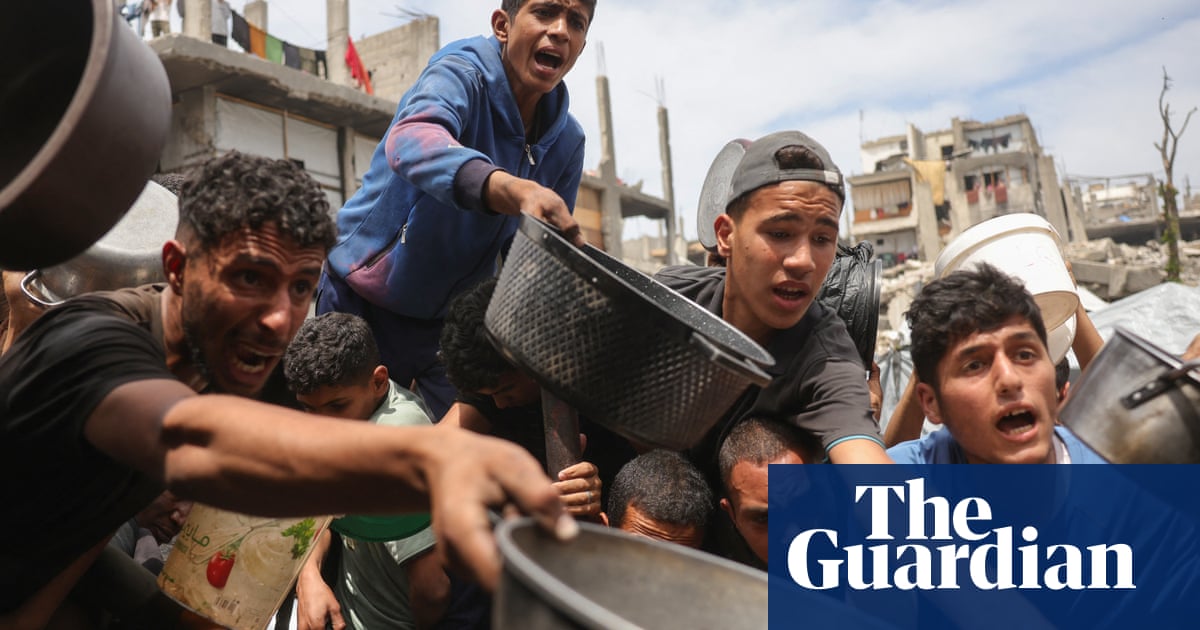Donald Trump has said people are starving in Gaza and the US would have the situation in the territory “taken care of”. Gaza has suffered a further wave ofintense Israeli airstrikesovernight.
On the final day of his Gulf tour, the US president told reporters in Abu Dhabi: “We’re looking atGaza. And we’re going to get that taken care of. A lot of people are starving.”
Israeli officials have consistently denied the tight blockade imposed on the devastated territory more than 10 weeks ago has caused hunger and Trump’s comments will be seen as further evidence of tensions betweenBenjamin Netanyahuand Israel’s closest ally.
There had been widespread hope that Trump’s visit to Saudi Arabia, Qatar and the United Arab Emirates could lead to a fresh pause in hostilities or a renewal of humanitarian aid to Gaza.
Instead, the raids and bombardmentover the past 72 hourshave raised the levels of violence in Gaza higher than for several weeks, with the death toll coming close to what was seen in the first days of Israel’s renewed offensive in Gaza after a fragile ceasefire collapsed in March.
Some officials in the Palestinian territory put the number killed by Israeli attacks on Wednesday and Thursday as high as 250. Estimates varied on the number of casualties overnight and on Friday morning.
Mohammed al-Mughayyir, a spokesperson for Gaza’s civil defence agency, said on Friday that 50 people had been killed since midnight.
At least 48 bodies were taken to the Indonesian hospital in northern Gaza, and 16 bodies were taken to Nasser hospital, health officials said, after strikes on the outskirts of the central town of Deir al-Balah and the southern city of Khan Younis.
A doctor at the Indonesian hospital in the city of Beit Lahiya, who requested anonymity, said that 30 dead and dozens of wounded, mostly children and women, had arrived at the hospital.
Yousef al-Sultan, 40, from the Salatin area, west of Beit Lahiya, said: “The Israeli occupation bombed the house next to mine, hitting it directly while its residents were inside.
“There is a massive wave of displacement among civilians. Fear and panic grip us in the middle of the night,” he said.
Hamas still holds 57 of about 250 hostages seized in its October 2023 attack on Israel, which resulted in the deaths of about 1,200 people, mostly civilians. Israel says the blockade and intensified bombardments since mid-March are intended to put pressure on the militant organisation to secure the release of the hostages. Less than half are believed to be still alive.
Israel’s retaliatory military offensive has killed about 53,000 people in Gaza, most of them civilians, according to the health ministry there.
A ceasefire that came into effect in January broke down in mid-March after Israel refused to move to a scheduled second phase that could have led to a definitive end to the war.
Sign up toFirst Thing
Our US morning briefing breaks down the key stories of the day, telling you what’s happening and why it matters
after newsletter promotion
Some of the heaviest Israeli strikes earlier this week were aimed at the current commander of Hamas in Gaza, who, Israeli officials said, was sheltering in tunnel systems under a big hospital complex in Khan Younis. Hamas has denied repeated Israeli accusations that it uses civilians as human shields.
Though there is limited fighting on the ground in Gaza, Israel has called up tens of thousands of reservists for a big offensive, in which troops will hold on to seized territory and lead to a significant displacement of the population,Netanyahu has said. Israeli ministers have spoken of “conquering” Gaza.
Israel, which claims Hamas systematically loots aid to fund its military and other operations, has put forward a plan to distribute humanitarian assistance from a series of hubs in Gaza run by private contractors and protected by Israeli troops.
The US has backed the plan, which has been described as unworkable, dangerous and potentially unlawful by aid agencies because it could lead to the mass forced transfer of populations.
Marco Rubio, the US secretary of state, on Thursday acknowledged the criticism and said Washington was “open to an alternative if someone has a better one”.
The US-based Gaza Humanitarian Foundation, which has been set up to manage the scheme, announced on Wednesday that it would begin operating by the end of the month and that it had asked Israel to lift its blockade to allow aid to reach the territory immediately.
Aid agencies have warned that any delay will cost lives, and that cases of acute malnutrition, particularly among young children, are soaring.
Polls in Israel show widespread support for a new ceasefire to secure the hostages’ release, but local media reports quoted statements from anonymous Israeli and regional officials downplaying any likelihood of a breakthrough.
Israel’s main group representing the families of hostages still being held in Gaza said on Friday that Netanyahu was missing a “historic opportunity” for them to be released.
Discussions on the longer term future of Gaza have faltered. On Thursday, Trump described his desire to turn Gaza into a “freedom zone”, a possible reiteration of aplan he put forward in Februaryfor the US to take control of the Palestinian territory to allow for its reconstruction as a luxury leisure and business hub.
